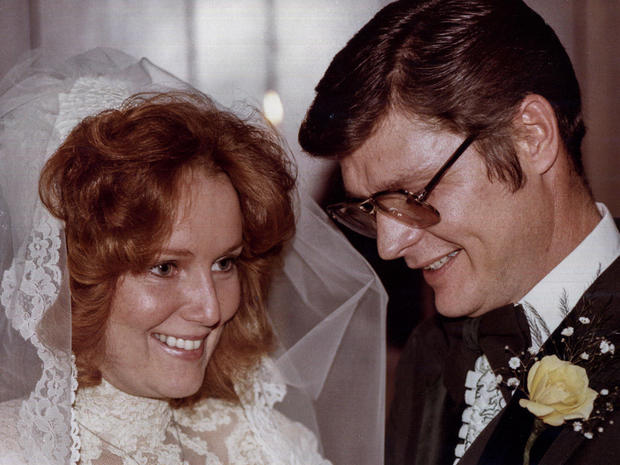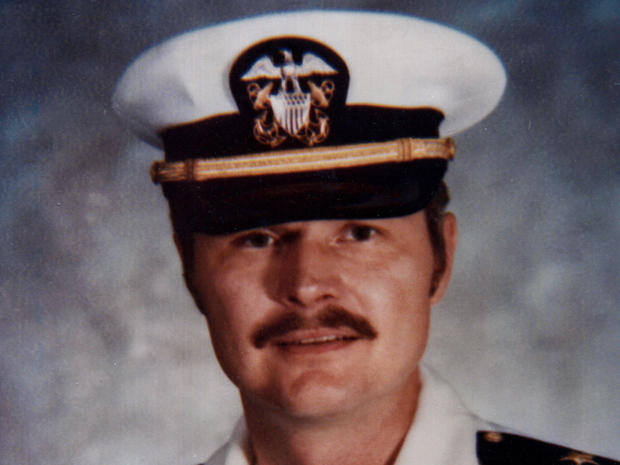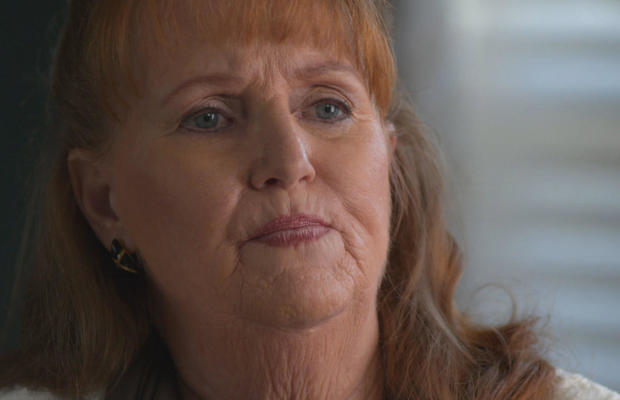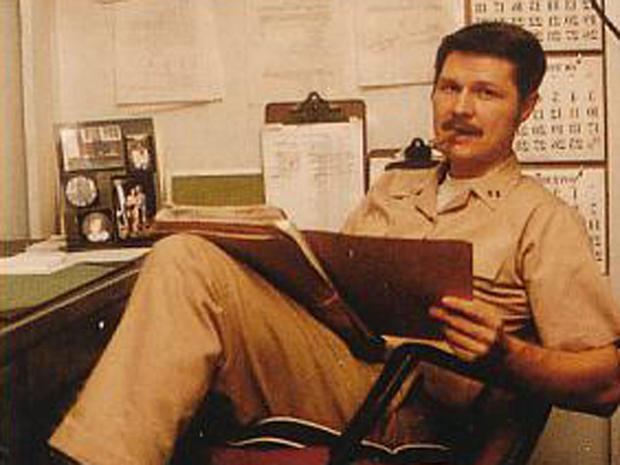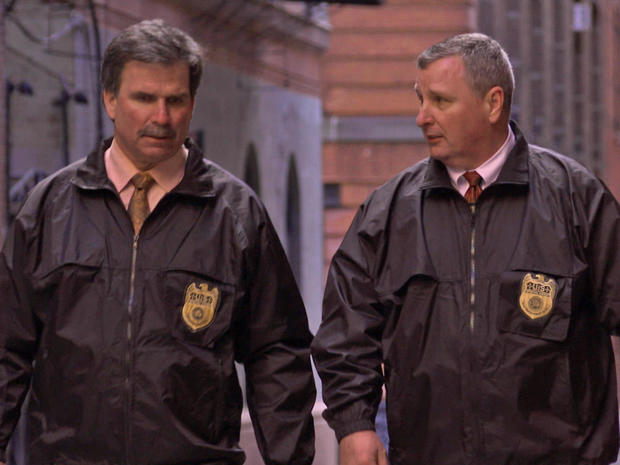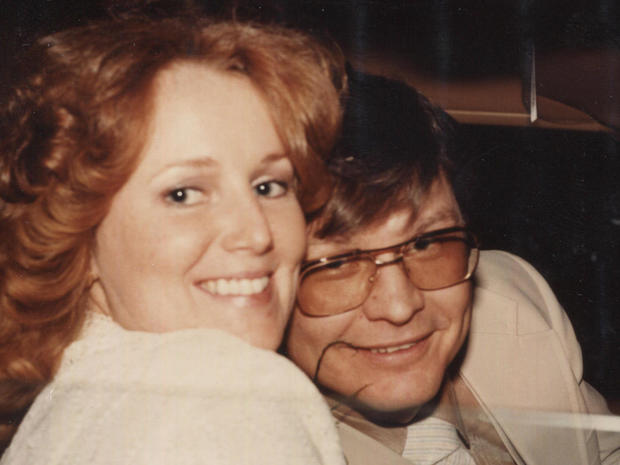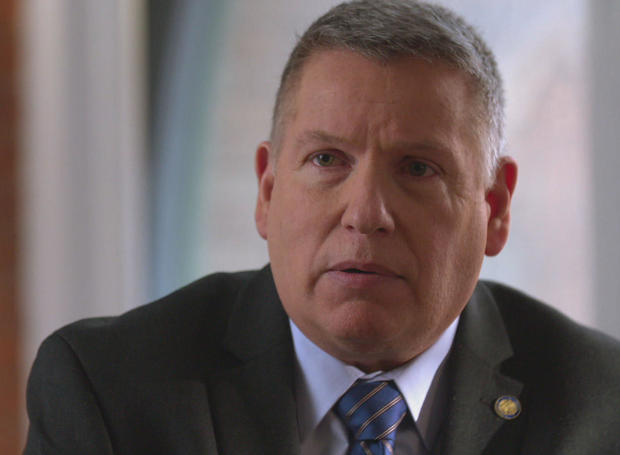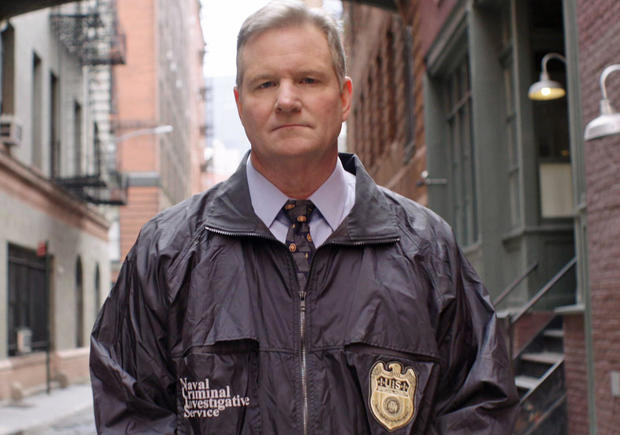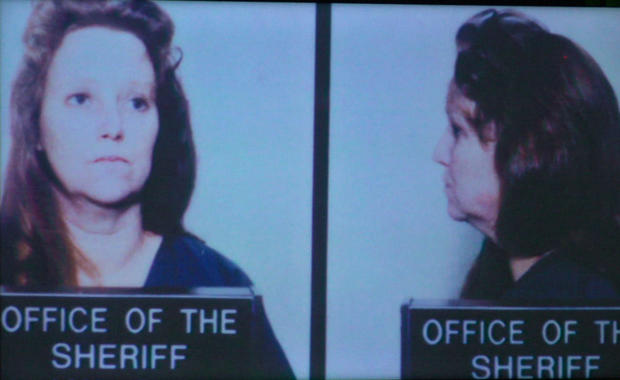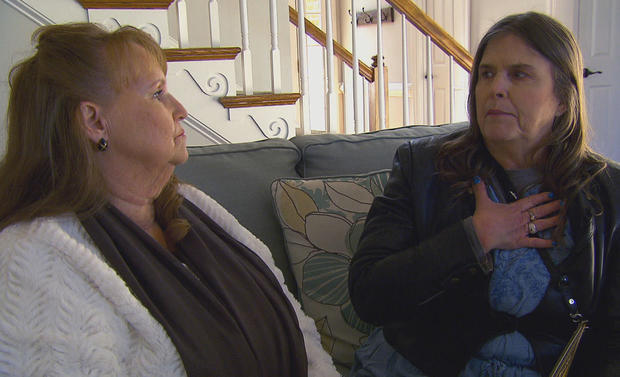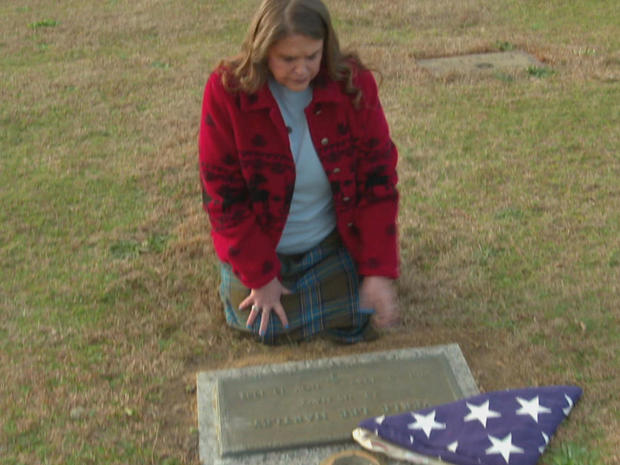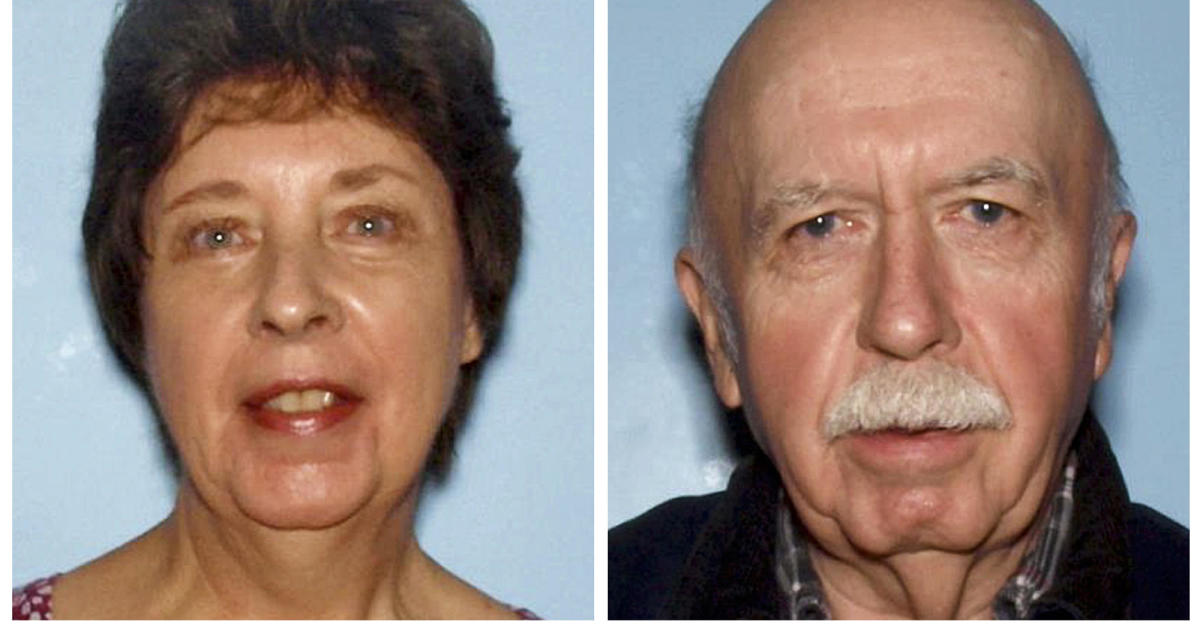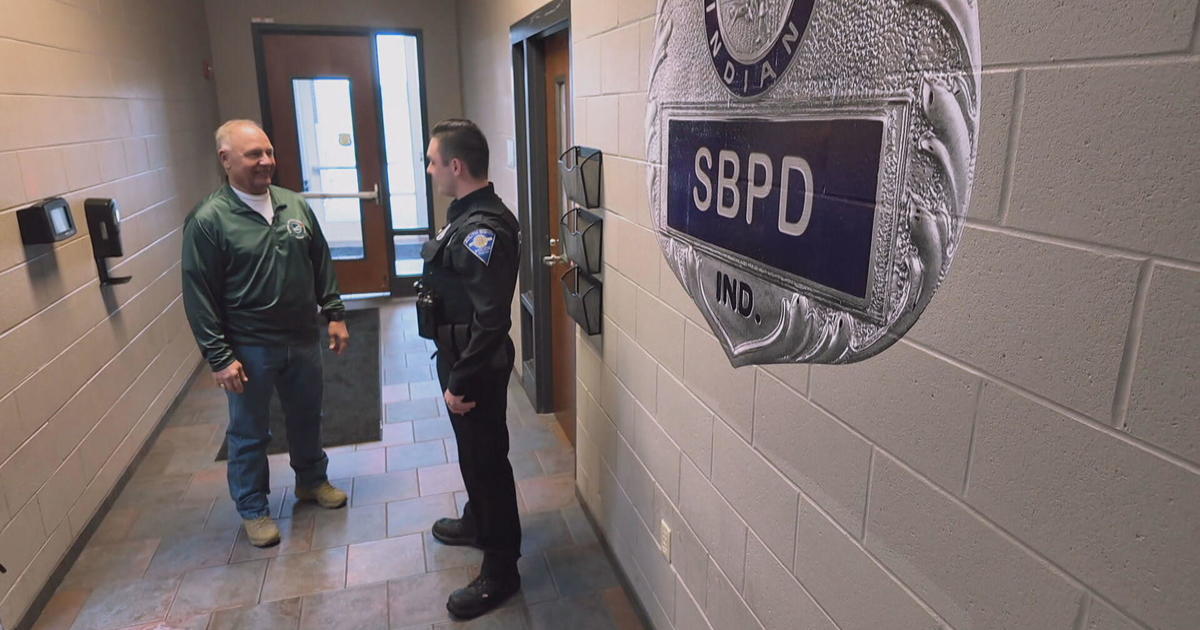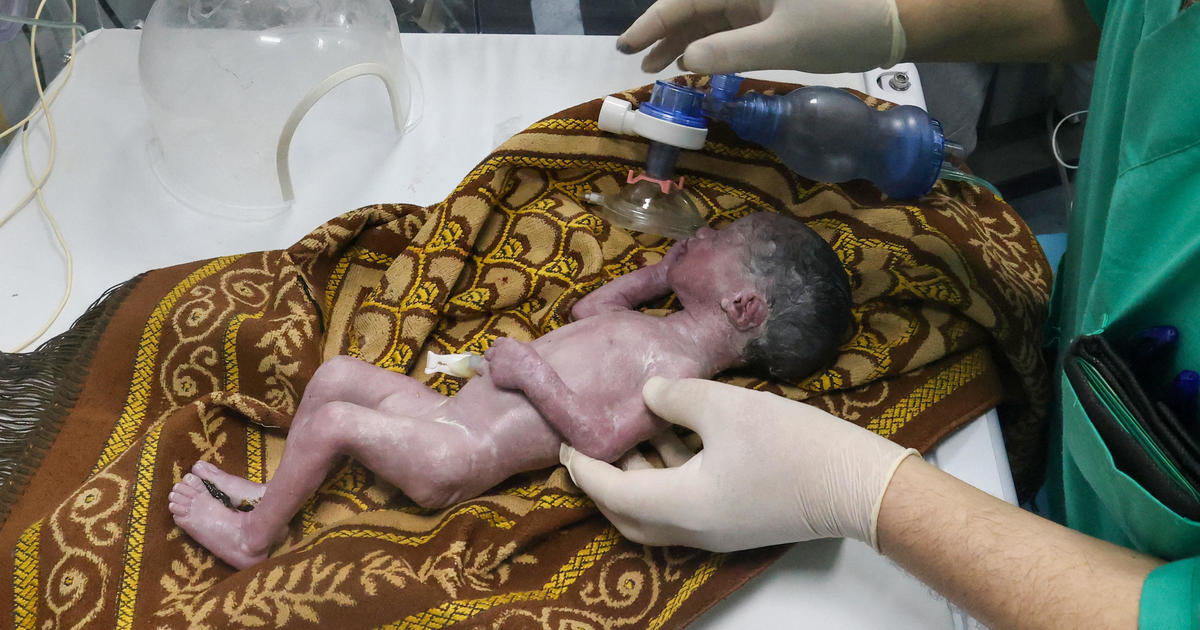Mysterious poisoning of a Navy lieutenant leads to one of NCIS' most notorious cold cases
Produced by Jonathan Leach
In the summer of 1982, Navy Lieutenant Lee Hartley, a discipline officer aboard the USS Forrestal, fell mysteriously ill while deployed in the Mediterranean. The ship's doctors were baffled by Hartley's illness and airlifted him to a Naval hospital in Mayport, Florida, where he received round-the-clock care from his new bride, Pamela. But after months of intense treatment, Hartley succumbed to cardiac arrest and died. An autopsy would later reveal the cause: a lethal toxin, administered for months while the lieutenant was at sea.
NCIS agents determined Hartley had been poisoned; murdered by someone with access and opportunity and soon turned their attention to the Forrestal. But with 6,000 potential suspects, finding the lieutenant's killer wouldn't be easy on a floating city. It would take challenging detective work, surveillance ops, and shrewd interrogation methods to finally break the case wide open and reveal Hartley's true killer – whose method for murder was almost as unbelievable as the motive.
The USS Forrestal was once a formidable warship in the Navy's fleet of supercarriers. But in 1982, it became the center of one of NCIS' most notorious unsolved cold cases - the murder of Lieutenant Lee Hartley.
Stephanie Hartley | Victim's daughter: You know I really loved my dad. … He was just the life of the party. … My father and my mom were very happy at one time. …And then my dad went through a mid-life crisis and fell in love with his secretary, Pamela Johnson. … I thought Pam was very pretty. … Pretty smile -- like an angel when I first met her.
Pamela Hartley | Victim's wife: Before I joined the Navy … I was a wildlife technician, that was my favorite job. … I joined the Navy because I fell for that commercial … "The Navy -- It's not just a job, it's an adventure." … I worked on a naval construction battalion base. … Lee was my commanding officer. … I know it wasn't right. But one thing led to another. And … we ended up … having an affair.
Stephanie Hartley: In 1981 … my parents split up. And he ended up marrying Pam when I was 11. … I think Pam was definitely too young for my father. … My dad, I think, was 35, 36 years old. … She was 23.
Pamela Hartley: We had a champagne wedding. … Everybody was having a good time.
Special Agent David Early | NCIS, Retired: Lee Hartley, at the time of his death, was a Navy lieutenant. He had enlisted in the Navy … and made his way up to the officer ranks. He's what's called a Mustang … because there's not a lot of individuals that do that.
Pamela Hartley: Lee had been out to sea a lot. He was tired of it. … It was hard for him to leave me. Me being his new wife…. This was supposed to be his last sea duty. … I think Lee only had been out for three-and-a-half months. And he got sick -- so sick, they sent him home.
Stephanie Hartley: When I showed up at the hospital … I started crying as soon as I'd seen him in the bed. … It didn't even look like my dad.
Special Agent David Early: Pam was at his bedside while he was in and out of the hospital, taking care of him trying to get him through this ordeal.
Pamela Hartley: When Lee came home … he'd get sick. I called the ambulance to come pick him up, took him back to the hospital. He'd get better. They couldn't find anything wrong with him.
Special Agent David Early: Eventually, after several weeks of this, he passed away in November of 1982.
Lieutenant Hartley's death was classified as a heart attack; he was only 37 years old.
Stephanie Hartley: I was very young. … It devastated my reality.
Special Agent Pete Hughes | NCIS, Retired: The day before Hartley passed, there was a doctor that determined that he may be suffering from heavy metal poisoning and requested a rush be done on some bloodwork.
Special Agent Pete Hughes: On December the 6th, 1982 … NCIS has got the lab results back. And it determined that … Lt. Hartley had a high, high level of arsenic in his system. … And essentially killed him.
Special Agent Jim Grebas | NCIS, Retired: Back then, and probably still today, they don't train doctors on arsenic poisoning. … Had somebody on that medical team not decided to do that, there may have been a chance this could have gone undetected.
Investigator Lou Eliopulos | NCIS investigative review specialist: Arsenic is a pure liquid killer. … It's odorless and colorless. It's been used as a homicide weapon for hundreds of years. … You can literally get away with murder. … What was found … was a level that was about 100 times the arsenic level that you would find in a normal human.
Special Agent Pete Hughes: When it came back that arsenic was in his blood … it's a game changer.
Special Agent Jim Grebas: We had a new ballgame. We have homicide.
But who was responsible for killing Lt. Hartley remained a mystery. The original agents knew the elusive killer needed to get close.
Gregory Ford, Executive Assistant Director, NCIS Criminal Investigations: When we initiate an investigation … we start normally with those who had the closest relationship to the victim. It's important to leave no stone unturned, because we never know what direction an investigation will take us.
Investigator Lou Eliopulos: Of course, we're going to look at folks that had opportunity. Certainly, at the time of his death, his wife had opportunity.
Special Agent Pete Hughes: Pamela Hartley was essentially his caretaker. …And she is at his bedside every day.
Special Agent David Early: So, in looking at all the different possibilities of who may have done this to Lee in considering Pam as a possible suspect, we look at -- usually money is the number one motivation or if there is a bad relationship and she simply wants out of that relationship.
Stephanie Hartley: Pam did not strike me as somebody that could harm my dad. Not at all. … They really did … seem happy.
Pamela Hartley: We were happy together. … Lee loved me … very much.
Agents learned it was a picture-perfect marriage, and results from Hartley's lab report proved to be a persuasive chemical alibi for Pamela.
Investigator Lou Eliopulos: What kind of turned us away from her at that point was in going back … we found that -- the most likely date that he was initially exposed to arsenic was … when he was aboard the ship out to sea and deployed and away from his wife.
Special Agent Jim Grebas: Lt. Hartley was getting sick while he was abroad in foreign lands.
Special Agent Pete Hughes: What access does Pam Hartley have to him while he's deployed on a essentially a 6,000-man island floating around in the middle of the Mediterranean Sea? … She doesn't. … So … who's given it to him? That's the question.
Special Agent Jim Grebas: Somebody murdered him. And that murderer was still loose, still walking around. And we need to figure out who it is and figure it out pretty quickly.
A Marked Man
Special Agent Pete Hughes: NCIS agents needed to go back to the ship. They needed to pursue every possible lead, to determine how Lt. Hartley ingested the arsenic.
Special Agent Jim Grebas: In the United States Navy, there are a lot of chemicals … This was a real mystery.
Special Agent Pete Hughes: They were able to determine quickly that the ship doesn't store arsenic anywhere.
Special Agent Pete Hughes: There was no doubt in our mind … he'd been murdered. There was no question. Now, we've got to figure out who's responsible for his murder.
The original agents were convinced that Lt. Hartley was deliberately poisoned by a fellow shipmate who smuggled arsenic aboard the Forrestal. But rooting out his killer wouldn't be easy on a floating city.
Pamela Hartley: Forrestal is a huge war ship. It's so big, you really don't even know you're on a ship.
Special Agent David Early: Essentially, there's 6,000 suspects they have to consider.
As the investigation unfolded, the NCIS agents heard a disturbing rumor: Hartley was a marked man and the writing was literally on the wall.
Special Agent Jim Grebas: Lieutenant Hartley talked about a message he saw written on the ship's wall saying, "Lieutenant Hartley is a dead man." … That's serious on a ship like that.
Agents suspected one of the sailor's Hartley disciplined may have written the menacing message. Hartley never learned his identity, but the threat was real.
Pamela Hartley: Lee feared for his safety. … And as a matter of fact, when he became sick … he thought somebody was poisoning him.
Special Agent David Early: He had told people that he'd been threatened aboard the ship. … He actually expressed reluctance on going on this last deployment. He simply said he had a bad feeling about it, he didn't know whether he would return from it.
Pamela Hartley: He was not very well-liked onboard ship. … I'm sure he had some enemies … simply because of his job.
Special Agent Pete Hughes: Lieutenant Hartley's position was incredibly important. He was putting the disciplinary packages together that would … decide what course of action, if any, was going to be taken against these sailors.
Special Agent Jim Grebas: I mean, working in a legal office … You're going to have threats made. … It's safe to say they weren't making a lot of friends on that ship.
Special Agent David Early: There could have been a long list of people … aboard ship that might have had a motive to retaliate against him. … It was hard to determine who may have done that because Lee was poisoned over a long period of time.
Special Agent Jim Grebas: When you're talking about arsenic poisoning … you have to look at access. Who has access to the person?
As the investigation continued, NCIS turned their attention to Hartley's closest friend and roommate, Lieutenant Stephen Lehr.
Special Agent Pete Hughes: Lehr is visiting Lt. Hartley at the Navy Regional Medical Center there in Jacksonville. So, he has access to him in the hospital where, he has those relapses.
Special Agent David Early: Lehr … would have had the most intimate access to him aboard that ship. … Living aboard ship in close quarters, not everybody gets along. And, so, we had to contend with possibility of his roommate doing this to him.
Pamela Hartley: It's possible that anytime you put … men on a boat in the middle of the ocean, they have to live with each other. … I'm sure that there's disputes go on all the time.
The agents soon learned that Hartley and Lehr were in direct competition for a major promotion. Could this have been a rivalry turned deadly?
Special Agent Jim Grebas: You're talking about their careers. … So, you have to look at the relationship these two gentlemen had, and also you had to consider both were up for promotion to lieutenant commander so there's competition. … Did they get along? Were they good friends or maybe they weren't such good friends?
With no evidence linking Lehr to arsenic, he was eventually cleared as a suspect. With no new leads and seemingly at a dead end, NCIS agents turned their attention back to their victim.
Special Agent David Early: In looking at Lt. Hartley's … mental health at the time that all this was happening … it was obvious that he was unhappy.
In 1983, a top military psychologist evaluated Hartley's background and determined he was "paralyzed by loneliness" and literally "lived from one letter to the next" while at sea.
Special Agent Jim Grebas: We know he didn't want to go on that cruise. … He was very homesick and he … wanted to be with Pamela to the point that's all he thought about.
Could Lieutenant Hartley have poisoned himself?
Special Agent David Early: [NCIS] could not rule out any possibility. …And so that drove agents … to consider maybe he had done this … to create enough ailment that he could be medically evacuated and returned home.
Special Agent Jim Grebas: It's a possibility in his mind. How do I get off?
Shifting Focus
In 1983, NCIS learned that Lt. Hartley was desperately homesick and suspected he would stop at nothing to get back to his new bride, Pamela. So, the agents shifted their focus to the most unlikely suspect: the lieutenant himself.
Special Agent Jim Grebas | NCIS, Retired: So, could he be taking arsenic to make himself sick and then that would get him back home?
Special Agent Pete Hughes | NCIS, Retired: It wouldn't be the first time that a sailor has manipulated the system to shorten up a tour at sea … to be … back home with their wives.
Special Agent Jim Grebas: We've had cases where sailors have done that. It's called malingering. It's actually punishable under the … Uniform Code of Military Justice.
Special Agent David Early | NCIS, Retired: I would think that if Lt. Hartley felt like he needed to do that he would have been in just a horrible state of mind because the physical pain that he would have gone through would have been excruciating.
Special Agent Jim Grebas: If he did this, what he probably didn't realize is when you take arsenic … it's cumulative and … will build up and … that can be a death sentence.
Special Agent David Early: Lieutenant Hartley … may have intentionally ingested poison … and simply overdosed.
Pamela Hartley: I see where people could think that. He was homesick. And he did want to come home.
Special Agent Pete Hughes: The agents … looked at him from a psychological perspective. They … had a -- well-known Navy psychologist look into Lt. Hartley's background. … And what he determined was … there was no reason to believe that he essentially took his own life or that he was manipulating the system.
Special Agent Pete Hughes: If he was self-ingesting the arsenic while at sea to get home … why would he continue to ingest … back home with … his new wife? … Made no sense. And the agents clearly saw this and decided … to shift their focus to his wife Pamela Hartley.
Piece by piece, the picture of Hartley's perfect marriage began to crumble.
Special Agent David Early: Lieutenant Hartley was jealous of his wife. She was much younger than he was. She liked to go out and party and be with friends. … She'd be dancing with other young men at the Officers Club. And … there may have been some … discord in their marriage. And that may have been one of the reasons why he wanted to get home so quickly, to either patch things up with her or keep an eye on her.
Pamela Hartley: Lee was very jealous, and he didn't like me talking to anybody else. … He didn't like that. He didn't like that at all. So that was a bone of contention in our relationship.
Special Agent David Early There's lots of ways to resolve bad marriages -- divorces, separations, things of that nature. … So just because they were having marital problems does not mean that the spouse would kill her husband.
But how could Pamela have poisoned Hartley while he was out to sea? The original investigators discovered that she had visited her husband in Spain while he was deployed.
Special Agent Jim Grebas: When carriers deploy, they often pull into foreign ports. And the wives will go out and they'll meet the husbands.
Special Agent David Early: Pam Hartley was in charge of the Officers Wives Club. And so … in August of 1982, while the ship was deployed, she went with a group of wives over to … Benidorm, Spain.
Pamela Hartley: I loved Spain. … We went out every day. … We drank our share of sangria every day -- every day, lots and lots of sangria.
After months at sea, Hartley longed for a taste of home and Pamela cooked up a dish to die for.
Special Agent David Early: Pam cooked breakfast at least one morning while they were in their hotel together.
Joining the couple for breakfast that morning was Hartley's good friend and shipmate, Lieutenant William Gilchrist.
Special Agent David Early: Both … Lieutenant Hartley and Lt. Gilchrist ate what Pam cooked. … Soon after the ship went back out to sea, Lt. Hartley went to the infirmary … complaining of nausea, diarrhea and abdominal discomfort, which was very soon after they had spent time together. … Lieutenant Gilchrist also suffered very similar symptoms … after that … visit.
Special Agent Jim Grebas: And they termed it medically as food poisoning. And I'm sure it was.
Investigator Lou Eliopolus | NCIS investigative review specialist: Arsenic is odorless, colorless. You can cook with it. … What we're looking for in terms of a killer, someone that is not only smart, but cunning.
It's a chilling scenario made all the more likely after agents discovered Pamela's unique job experience working as a wildlife lab technician.
Special Agent Jim Grebas: The agents learned … that she had lied about ever handling arsenic. … She knew about it. She was trained in it. … when asked about it before as part the original investigation, she denied it. So why lie?
But those lab results revealed Hartley had arsenic in his system well before Spain. But how? The original agents soon discovered that the young wife knew the perfect way to keep her husband happy at sea, and she did it with a little taste from home.
Special Agent Pete Hughes: The investigation clearly showed that she would send care packages out to Lt. Hartley as most wives did. … You know, being a crew member on a ship out at sea for six months, you look forward to care packages from loved ones. And Pam … could be sending arsenic-laced cookies … to Lt. Hartley at sea.
Special Agent David Early: So, as we put all these things together -- the access and the knowledge of arsenic, the unhappy marriage … the evidence of Lee's poisoning and … when he was poisoned … there is no doubt Pam is the only one who could have done that. … And when you come to that conclusion you realize she is a … cold person that simply wants to do away with her husband no matter what the cost, no matter what the suffering.
Could agents prove that Pamela was the killer?
Special Agent Pete Hughes: In my opinion, Pam Hartley was a heartless black widow.
Special Agent Jim Grebas: And her venom was arsenic.
A Plan To Kill
Gregory Ford, Executive Assistant Director, NCIS Criminal Investigations: Unlike television shows, we don't solve our investigations in an hour. … but some of the investigations NCIS conducts frequently seem like they're made for television.
In an episode of "NCIS," a military spouse is accused of poisoning her husband with laced care packages while he was deployed in Spain:
GIBBS: What'ya got Jimmy?
PALMER: Well, Petty Officer Sweeney … definitely died of a cardiac arrest.
DUCKY: We haven't been able to find … the injection of a toxin.
MCGEE: How do you think it got in his system?
ABBY: That's a good question and the answer is tragically, death by cookies.
Gregory Ford: You can't make this stuff up.
Special Agent David Early: It was clear in our minds … that Pam was responsible for Lt. Hartley's poisoning death. … Knowing she did it is one thing. Proving she did it … is a long way down the road.
Without any physical evidence, the case against Pamela Hartley would rely on a confession. In 1983, six months after her husband's murder, agents brought Pamela back to NCIS for questioning.
Pamela Hartley: I had to take the lie detector test. And they … were asking me questions … like, where I was born and what city I lived in … basically yes or no answers. And then close to the end … I said, "Why don't you … ask me if I killed my husband?"
What happened next stunned the original investigators.
Special Agent Jim Grebas: Pam Hartley took the polygraph. And the results came back "no deception indicated." …She passed with flying colors.
Special Agent David Early: We put a tremendous amount of weight into polygraphs at that time. … So, with her passing that polygraph they felt like she was not responsible for his death.
Special Agent Pete Hughes: That was a game changer. She was eliminated as a suspect.
Special Agent David Early: There really is nowhere else to look at this point. So, the case ends up being closed.
As the years dragged on, the mystery of Lieutenant Hartley's unsolved murder would haunt the agents of NCIS.
Special Agent Jim Grebas: There are certain cases … that really just get to your core. … Those horrendous cases We do personalize them. … it's so dark. It's so evil.
Nearly 13 years later, NCIS' cold case squad re-opened the investigation, determined to solve it for Stephanie and her mother.
Special Agent David Early: In 1995 … this case was … determined to be very important. … And really cried out for justice.
Stephanie Hartley: Dave Early … came to … talk to me … and my mom … about Pam. … I sat behind her with my arms around her. … She just knew the whole time that Pam had did it. She just knew it.
And she was dead right. After reviewing Pamela's polygraph, the cold case agents made a startling discovery.
Special Agent Pete Hughes: She lied during that polygraph examination and somehow the charts were misread.
Special Agent Jim Grebas: It was determined … that it should have been inconclusive, not that she passed.
For nearly six months, the cold case squad had Pamela under constant surveillance as agents searched for hard evidence.
Special Agent Jim Grebas: When we decide we're going to reactivate … a cold case … we actually conduct an autopsy on the case. … We take everything they did, the previous special agents … and cut everything apart.
Special Agent Pete Hughes: You want to look at anybody and everybody who was important in that person's life.
And the agents learned back then, with her husband at sea, no one was closer to Pamela than the women of the Officers Wives Club.
Pamela Hartley: The Officers Wives Club was a big party … until the men came home. … We hung out at the Officers Club. … We'd dance with the men that were there … and we'd drink.
And after a few drinks, the wives weren't afraid to say anything.
Pamela Hartley: The remarks that they would make, like, "Oh, I wish this ship wouldn't come in." … Or, "I wish somebody would push so-and-so off the flight deck" … really shocked me.
Agent David Early: In the initial investigation there was a statement from Mickey Bell, one of the dependent wives.
What the agents discovered in Bell's 1982 statement was alarming.
Special Agent Pete Hughes: Mickey Bell was … Pamela Hartley's best friend … And shares a very, very important piece of that information. And that was that Pamela Hartley had confided … that she wasn't happy in the marriage. And she just wished that he was dead.
And while her husband was fighting for his life in a Navy hospital, Pamela asked Bell if she knew a hit man who could finish the job.
Special Agent David Early: Mickey was interviewed extensively about it and it was kind of written off as a joke. She didn't really take it that seriously. But to us you know where there's smoke, there's fire. … If you're thinking about it, you're going to do it.
And Mickey Bell wasn't the only one to know about Pamela's plan to kill her husband.
Special Agent David Early: Pam told Mickey that she was going to hire her own brother … Fred Johnson to kill Lee.
Special Agent Pete Hughes: What we were told was Fred Johnson was never interviewed before. …We knew Fred Johnson was going to be an incredibly important person in this thing.
And as the investigation unfolded, the cold case agents learned that Johnson was staying with the Hartleys while Lee was being slowly poisoned.
Special Agent Jim Grebas: And all of a sudden, within two days of Lt. Hartley's death, Fred Johnson just vanishes. He's gone.
Special Agent Jim Grebas: He left because he knows something's going to happen.
It was time for NCIS to confront the siblings. On March 1, 1996, agents brought Pamela and her brother in separately for questioning.
Special Agent Jim Grebas: Now it's time … for the showdown. … the intensity is there. You can feel it. This is it. … When we get inside the box … game on.
But instead of answering the agent's questions, this time, Pamela asked for a lawyer and shut down the interview.
Special Agent Jim Grebas: She lawyered up. Now we're on the verge of this case going cold again. So, Pete and I knew we had to get the information out of Fred Johnson.
And they wasted no time hammering him for information.
Special Agent Jim Grebas: Fred Johnson was like a nail that popped up. And Pete and I went to pound that nail to get to the truth. … He was going to tell us … one way or the other.
The agents needed Johnson to believe that his sister was pinning him for murder. The interview lasted for hours and Johnson remained cold as ice.
Special Agent Jim Grebas: Fred Johnson is under a lot of pressure. And what we're seeing is a lot of anger at this point. … This was really -- a hostile witness interview:
FRED JOHNSON [INTERROGATION AUDIO]: I can't believe what I'm hearing. … I don't want to hear it. … That irritates the living hell out of me.
Special Agent Pete Hughes: We had that gut feeling … that he's involved. … And we're making him believe that Pam is saying essentially the same thing.
Special Agent Jim Grebas: We start laying it out and say, "Look, your sister's being interviewed right now. … You're involved."
Special Agent Pete Hughes: That's when he's on his heels. He's backpedaling. He -- we got him on the ropes. And we're putting the right pressure on him. And the pressure was the truth.
The Truth Revealed
Special Agent David Early: We knew that Fred Johnson was going to be a crucial witness.
Special Agent Jim Grebas: He has information about a possible murder. … We know it. … He had a big decision to make.
After carrying a dark secret for years, Fred Johnson knew it was time to tell the truth about what really happened to Lt. Hartley. He told the agents it all began with a conversation with his sister:
FRED JOHNSON [INTERROGATION AUDIO]: Pam … was telling me how miserable she was and how unhappy she was. … she just wishes he … was dead … She's bringing up an idea about getting rid of Lee. You know, makes a statement to me about knocking him off, getting rid of him. … "Let me be the hit man, Fred, you do it for me, brother Fred."
Special Agent Pete Hughes: "Let's poison the son of a bitch." That's exactly what Fred Johnson told us. … Poison his food while he's on the ship.
Special Agent Jim Grebas: We've just hit gold. We've just unlocked the secret.
Special Agent David Early: Fred … bared his soul and told NCIS … he was convinced that she had done it.
Special Agent Jim Grebas: One of the agents did tell her, "your brother has just confessed." … Pamela Hartley knew that her ally, her brother, had …. implicated her. So, it was over. She was done. … cooked. Put a fork in her.
Johnson was never charged with a crime. After his release, Pamela demanded to know what her brother told NCIS, but Agent Early remained silent.
Special Agent David Early: We thought we were done with Pam, essentially. And after a few minutes she piped up and said, "I killed Lee. And I'm ready to tell you everything."
Special Agent David Early: Pam told us that she … bought rat poison … laced with arsenic … and had put it on Lee's food at different times.
Special Agent Jim Grebas: She provides the final lethal dose of rat poison in his apple juice while he's laying in the hospital bed. … The last thing he saw before he went into a coma was probably his wife … poison him.
Nearly 14 years after Lt. Hartley's death, Pamela was charged with first-degree murder.
Pamela Hartley: I wanted to be caught. I wanted to be stopped. I didn't want to keep on doing what I was doing. But I couldn't stop myself.
Special Agent David Early: When I asked Pam why she used … poison, she said that women have been poisoning husbands for thousands of years, basically.
And Pamela's method for murder was as unbelievable as her motive.
Special Agent David Early: Pam said she killed Lee because … she didn't want to hurt him with a divorce. ... I found that just astonishing.
Pamela Hartley: I've known a lot of people to divorce. And divorce hurts. I didn't think past my actions. … When the officers wives started talking about … not wanting the husbands to come home, that -- that planted a warped seed into a warped mind. And that's how that seed got planted and started growing, how to get rid of Lee? … It was difficult watching what I was doing to Lee. … I knew that poison was in him and that … I had done it to him. And it broke my heart.
Special Agent David Early: I don't know that Pam understands the difference between mercy and murder. I don't know how someone could watch someone suffer for weeks on end and not have mercy.
Even today, investigators find Pamela Hartley's actions unconscionable.
Pamela Hartley: I understand now what the difference between murder and mercy is. It was not merciful what I did to Lee. It was not merciful. It was murder. I killed my husband not because I loved him. It was because I didn't want to be with him.
Special Agent Jim Grebas: Lieutenant Hartley was fighting enemies overseas, but, ironically, his biggest enemy was sleeping with him at night. And that was Pamela Hartley.
Stephanie Hartley: When I learned that Pam … killed my father, I was blank. … I had no emotion. I had no thoughts. … I just don't know what would possess her to do something like that. But a murderer is a murderer.
Special Agent Pete Hughes: On October 1, 1996 … Pamela Hartley pled guilty … for murdering her husband. She was sentenced to 40 years in prison.
Stephanie Hartley: I went to Pam's sentencing. … She was in shackles. And it didn't even look like her. … I was just trying to see the 23-year-old that I once knew. … the innocent face and the … pretty smile. … She didn't even look like the same lady.
For Stephanie, the memories of her father remain alive as ever, but the nightmare hasn't ended. In 2012, after serving only 15-and-a-half years in prison, Pamela Hartley was released.
Pamela Hartley: It saddens me to know that I killed the man, the only man that's ever loved me and probably will ever love me.
Though Pamela has accepted responsibility for what she's done, she knows that she may never be forgiven.
Pamela Hartley: I do think about the people that I've hurt, especially Lee's daughter. … I'd tell her … that her dad didn't deserve what I did to him. … That I love her. I always have [cries]. That's it. That's it.
Stephanie Hartley: I still cannot believe that she did that to my dad. … It hurts. … I never visited my father's grave. … I was kind of afraid … Pam might be there.
The road to forgiveness has been long and painful, but 36 years later, Stephanie agreed to meet Pamela face-to-face for the first time since her father's murder.
Pamela Hartley [in her living room with Stephanie]: Come here to me.
Stephanie Hartley: I forgive you. I forgave you a long time ago.
Pamela Hartley: Come here, let me hold your hands. I don't know what to say. I just I have to thank God for this minute.
Stephanie Hartley: My dad, he was a lot to me, Pam.
Pamela Hartley: I know he was. And I'm so sorry Stephanie.
Pamela Hartley: You know I'm so sorry. … Come here, I want to hold you.
Stephanie Hartley: It's very hard to forgive yourself. …It's easy to say but hard to do.
Special Agent David Early: I hope for Stephanie that she can find some kind of peace in knowing that there were a lot of people out there who cared about what happened to her dad. And tried to bring justice to her father.
Gregory Ford: ...Our agents will never quit in the pursuit of justice. …We owe that to the victims. We owe that to the Department of the Navy. And we owe that to the general public.
Pamela Hartley remains one of the coldest, most complex and calculating killers the agents of NCIS have ever encountered.
Special Agent Jim Grebas: We have a motto "to the living we owe respect, to the dead, we owe the truth." … We don't forget.
Stephanie Hartley: I'm very grateful that they … thought my dad was that important. I appreciate that [emotional]. …I just wish … that he was still alive.
For the first time ever, Stephanie visited her father's grave.
Stephanie Hartley [crying at gravesite] I miss you so much, dad. I love you. I always will.
